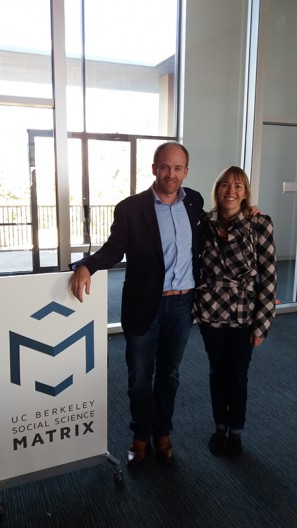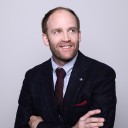From last August until Mid-February 2018, I am at the University of California, Berkeley, as a visiting scholar, which is a unique inspiring experience.
Simply put, it is inspiring to be here. On one of my first days, I was walking towards the office provided to me by my hosts at the Institute of European Studies (IES), and I saw a sign that said ‘Parking space reserved for Nobel Laureate.’ It was the first in a line of 7 or 8 spaces. Then, seeing the cars parked in some of those spaces, I knew that Nobel Prize winners were giving courses and conducting research as I was drinking my coffee. That was quite a feeling. I have also been able to meet, consult and have coffee with a number of professors, whom I knew only from their published work before my arrival. Now, I can count a few of them as colleagues and mentors. To have the opportunity to speak with such accomplished and internationally known academics is inspiring. In addition, the university being public, students and faculty seem to be grateful to be here, rather than feeling entitled, and generally, people are open and genuinely excited to meet with scholars from abroad. Furthermore, the resources to which visitors have access (12 million books in the libraries on-campus and immediate journal article access for every journal imaginable) allow me to get more secondary source research done in one day than I can get done in Luxembourg in a week. Improving our access to digital sources and online journals will be a priority of mine when I get back.
It is a unique place geographically as well. Built on a hill, the whole campus climbs the mountain, leading to the stadium, before turning back towards San Francisco bay. On many mornings, San Francisco is hidden by a wall of fog that usually stays away from Berkeley, and not surprisingly, the weather here is great. Sun almost every day so far. I think this could be the first year where I will go from summer straight to spring. That will be a nice change after the last few autumns in Luxembourg.
Specifically, in terms of my work, I am being hosted by the Institute of European Studies (IES), and I am working with Director Jeroen Dewulf and Professor Mark Bevir. Both have helped me greatly, Prof. Dewulf by introducing me to his colleagues and organizing my lectures, and Prof. Bevir, by consulting with me about my work. While at the IES, I have also been engaged in a number of activities relating to my FNR-funded project (BENELUX) and the activities of the IES. For project BENELUX, I am taking advantage of the Dutch and BENELUX Collections in Doe Memorial Library, in order to fill in some of the gaps in source for my research project. I have also given two lectures while at the IES. The first, co-organized by the IES and the Berkeley Social Science research matrix, was about the evolution of internal and external EU migration rules, from the inception of the ECSC in 1951 to the present day. The second, hosted by the IES and posted here, looked at the legacy of WWI and WWII reparations on the integration process, from 1945 to the present. Both lectures were received well, and generated a lot of questions and interest about European integration and the current crises gripping the EU.
However, it also reinforced my personal belief in the importance of teaching issues in the contemporary history of Europe. As Jean Claude Junker said in his speech at Belval in October 2017: ‘understanding the history of others is crucial for the future of Europe’. Living in the US, especially here in Berkeley, in the first year after Trump, and seeing the shock that he continues to spread here on an almost daily basis, highlights how in general, a lack of knowledge / education has contributed to his rise and to his ability to stay in power. It also highlights the weaknesses of the American political system, and its inability to safely remove leaders from power. As a result, I appreciate even more how unique Europe is, but also how it needs to be protected and nurtured, and how the misconception about it and its history need to be countered. I truly feel that all of us have a profound responsibility to do as much as we can to reach out to the public in this area, and I am very proud to be part of the C²DH which is seeking to do so.
While at Berkeley, I have also audited as many as possible undergraduate and graduate courses in History in order to experience how they proceed at a world ‘top-10’ university. It is an experience I will always value since participating in lectures in a foreign country is a great way to add different perspectives and techniques to my teaching repertoire. I will incorporate as many of the positive elements I find here into my teaching in Luxembourg.
I have also been asked by Director Prof. Jeroen Dewulf to be the IES’s representative in Luxembourg upon my return to Europe, a request which I gladly and immediately accepted. I encourage all students and colleagues alike who may be interested in applying for a visit to Berkeley as a visiting student or as a visiting scholar, to contact me so that I can help them make their visit a success.
All the best from California.




